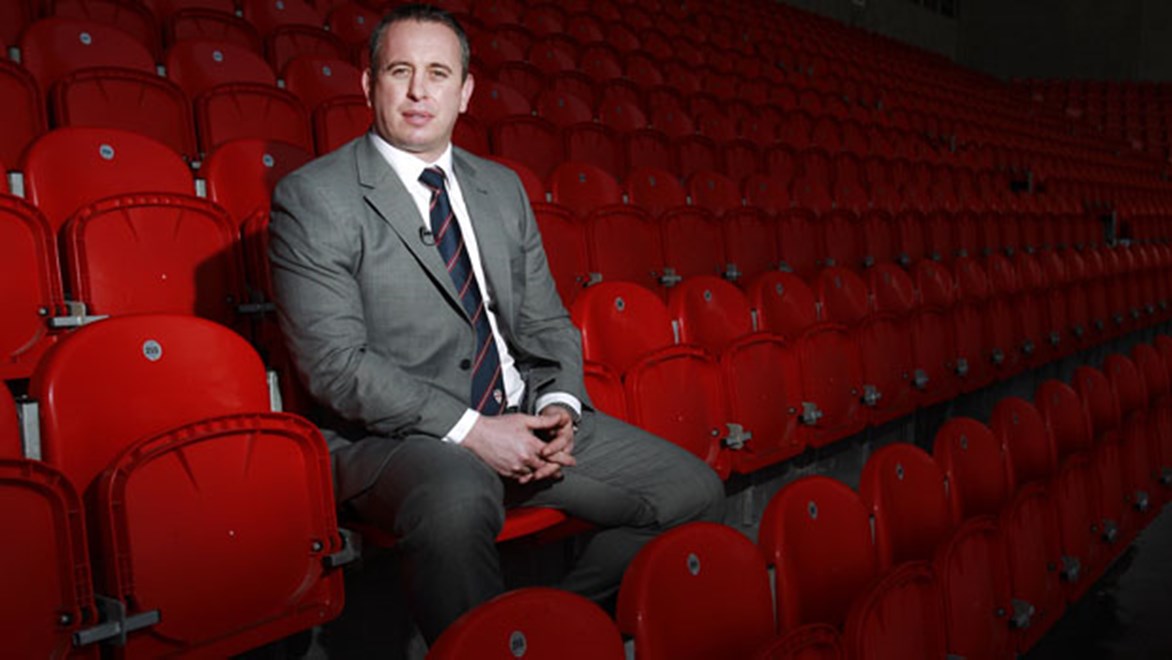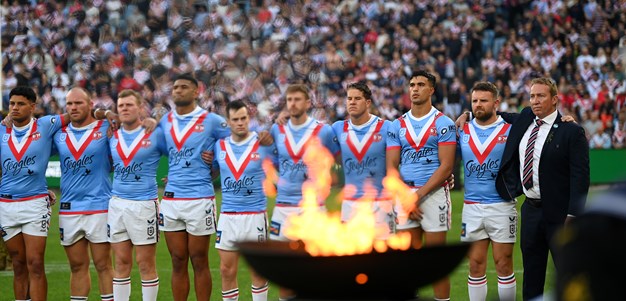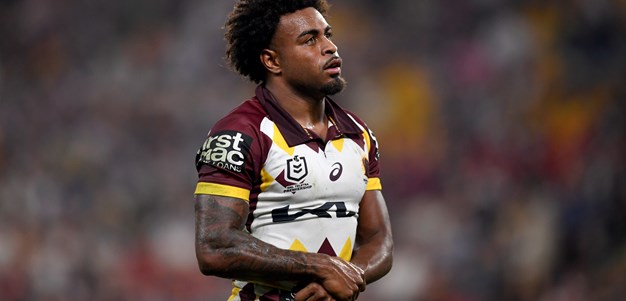

From iconic Henson Park in driving rain and mud, to a fever-pitched Suncorp Stadium packed to the rafters and baying for State of Origin blood, England coach Steve McNamara has left nothing to chance during his whirlwind fact-finding tour of Australia.
During his 14 days Down Under McNamara ran his eyes over nine NRL games, one State of Origin match, one NSW Cup match, visited five separate NRL clubs and met with a host of England candidates as he prepares his country for a real tilt at the 2013 Rugby League World Cup.
England’s opponents in the opening game of the tournament, Australia, are about to go to battle – against themselves – in the hugely anticipated State of Origin decider, a game in which notions of national pride and unity are not only put on hold, they are looked at with contempt and disdain.
While the Australian team members rip and tear into each other with high intensity and ferocity, McNamara is quietly going about his business preparing England with one goal in mind.
It is not enough to simply host the prestigious tournament on home soil; McNamara is embarking on a campaign to shock the world and claim England’s first ever World Cup*.
It is the reason for his hectic visit to Australia; it is the reason the England squad meets every seven weeks; and it is the reason the team will travel to South Africa before the tournament begins to prepare at high altitude in an intensive training camp.
England are doing everything possible in pursuit of their goal, including organising to play their first ever international against Italy, just seven days before their opening World Cup game against Australia at Millennium Stadium on October 26.
McNamara is a driven man. He has no illusions of grandeur as to how difficult the job will be – but he is ensuring there can be no excuses should the team not achieve their aim.
“We have given ourselves the best opportunity to perform well in the 2013 World Cup,” McNamara told NRL.com. “We are really comfortable with what we have done since last World Cup to this point.
“When you accept a job, you understand the rules and regulations around it, when you take the job you accept how it is positioned… the key is to maximise the time you have and get the most out of it.
“Our elite squad gets together every seven weeks, we never go longer than that without getting together as a group; that has been really good for us,” he continued.
“To come out to Australia and to engage with [players eligible for England] and for them to understand exactly what we are doing back home and why we have been doing it, is very important.”
While putting the framework together in anticipation of the tournament, the real challenge for McNamara will be when his two groups of players come together at the end of the season to form the England World Cup Squad.
In a relatively short timeframe, the players who compete in the English Super League and those plying their trade in the National Rugby League need to coexist. But more than that, they need to believe.
McNamara says everything since the last World Cup in 2008, when England surrendered embarrassingly to Australia 52-4, has been working towards not only redemption, but greater glory.
It is not hard to see the improvement in the team. Twice in the ensuing years they have taken on Australia in a Four Nations Final on home soil after knocking out New Zealand. Twice they have been up to their eyeballs in the contest, only to wilt in the final 20 minutes.
The squad has largely stayed the same and the lessons learnt are driving the team onwards. Australia are no longer seen as ‘mission impossible’. The more they get to take on the might of the Kangaroos, the more confident they become that they not only belong, but can succeed.
“There has been a fair bit of consistency and continuity in our selections and that has allowed our team to get confidence in themselves and each other,” McNamara said.
“We won’t be too dissimilar from that. Obviously there are some exciting new candidates in George Burgess and a couple of others… our players just need international experience.
“In days gone by you would play the Ashes series and you would play Australia three times, New Zealand twice. Then it went to Tri-Nations where you would play Australia twice and New Zealand twice. You got to play at least four games and then a fifth if you made the final.
“Then we went to a Four Nations where we would play Australia once and New Zealand once and if you didn’t win, that was it.
“For us, since that last World Cup, it was important to get as many games into the group which would help us to improve for the World Cup.
“The interesting thing about our squad is that when you look at it, it looks like the majority of the squad will be around for the next World Cup, if not the one after that.”
Australia will go into the tournament as raging favourites, while New Zealand are reigning World Cup champions. But England are confident the gap has been closed. They have beaten the Kiwis the last two times the Four Nations tournament has been held in England and there is a growing confidence in the squad that they can do something special.
Australian fans are typically ignorant or dismissive about the game in England. But times are changing. McNamara acknowledges that to get attention and respect, the English need to perform on the biggest stage against Australia.
It is how a relatively ‘unknown’ Sam Burgess announced himself to the world in 2009; by stepping Petero Civoniceva cold, then (shock-horror, in the same run) stepping again to leave Billy Slater grasping at thin air on his way to the try line in the Four Nations Final. Five minutes later, when he crashed over the try line again, he had Australia’s complete attention.
Burgess had signed with South Sydney and the rest is history. He was a made man.
“We have to do it against Australia to get recognition, it seems,” McNamara said.
“Two years before he stepped Petero, he put Fuifui Moimoi on his backside as an 18-year-old. We always knew he was special, but it took that match against Australia for him to get noticed by your sporting public.
“I think it is changing though; the World Club Challenge has been great because it gives our players a stage to showcase our game, our skills. I think that fixture has proven over the years that our competition is pretty good.
“Everyone always tries to compare the two competitions, I guess; they are just a different brand of football. I wouldn’t say one is better than the other.”
So as Australia’s gaze narrows to the State of Origin decider, McNamara and England wait.
If England makes the World Cup Final, Steve McNamara’s journey will be complete. From a rugby league pilgrimage to one of the game’s most historic grounds to a World Cup Final at one of the most famous world sporting venues.
*England have never won the World Cup; however Great Britain won the World Cup three times, in 1954, 1960 and 1972.
Follow Andrew Bryan on twitter: @AndrewBryan321


